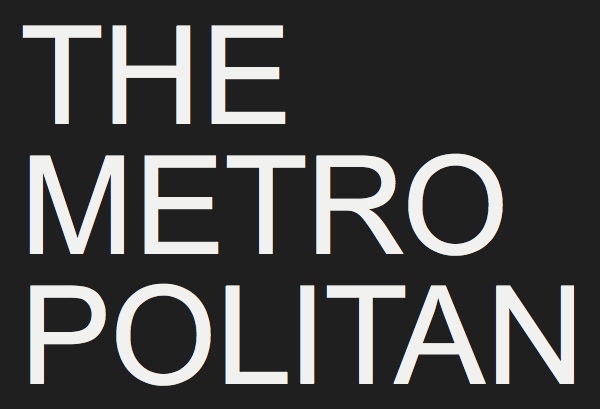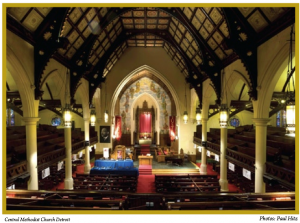Detroit was considered the Wild West in 1804, when Rev. Daniel Freeman, a circuit-riding pastor (traveling on horseback) became the first Methodist to preach a sermon in Michigan. For a hundred years prior to that Detroit was French and exclusively Catholic. Rev. Nathan Bangs the next circuit rider to come that year called Detroit “a most abandoned place.” Bangs wrote that he “left shaking the dust off his feet in testament against them.” This dissuaded further circuit riders until 1809 when Rev. William Case came to town. He complained to his bishop about “the difficulty of finding any serious people” in Detroit. When that next circuit rider, Rev. William Mitchell, came to Detroit i n 1810 seven believers formed The First Methodist Society of Michigan, (still Central’s legal name), the first protestant congregation in the Michigan territory, (statehood would not arrive until 1837). The congregation met in the government council house for the first few years, then in 1818 built a log church on the Rouge River in what is now Dearborn. By 1826 the congregation had its own building back in the city of Detroit. Some stayed at the log church and formed First Methodist Church, Dearborn. Finished in 1867, the present sanctuary is the sixth building occupied by the congregation.
Central has had a long history of activism in the struggle for peace and justice. In 1830 when Central was located near the present Compuware headquarters, its roof served as a prime viewing spot for the throngs that gathered to watch the execution of William Simmons, who killed his wife in a drunken stupor. The sheriff, a member of Central, resigned his post rather than violate his Christian convictions by participating in the hanging. Simmons reportedly sang a hymn to the tune of Old Hundredth before he was hung. The crowd was so horrified by the gruesome spectacle that they stormed the river, threw the flogging post into the river and demanded an end to capital punishment. It is believed that many Central members were in that throng that insisted that Michigan become the first English speaking territory in the world to abolish capital punishment.
In the 20th century, Central also pushed for formation of the League of Nations and the United Nations, became an integrated congregation in the 1950s, established a draft counseling center during the Vietnam War era, and continued to be at the forefront of nonviolent protest for peace and racial justice. Peace rallies and marches in Detroit often started at Central. Central has also attracted many nationally and internationally known leaders in the struggle for peace and justice. Dr. Martin Luther King, Jr. often preached at Central, the last time just two weeks before his assassination. In fact Dr. Henry Hitt Crane, senior minister at Central from 1938-58 and personal friend of King’s, tried to get King to assume the senior pastorate when he retired. King reportedly turned down the opportunity saying that his busy schedule would be unfair to the congregation.


